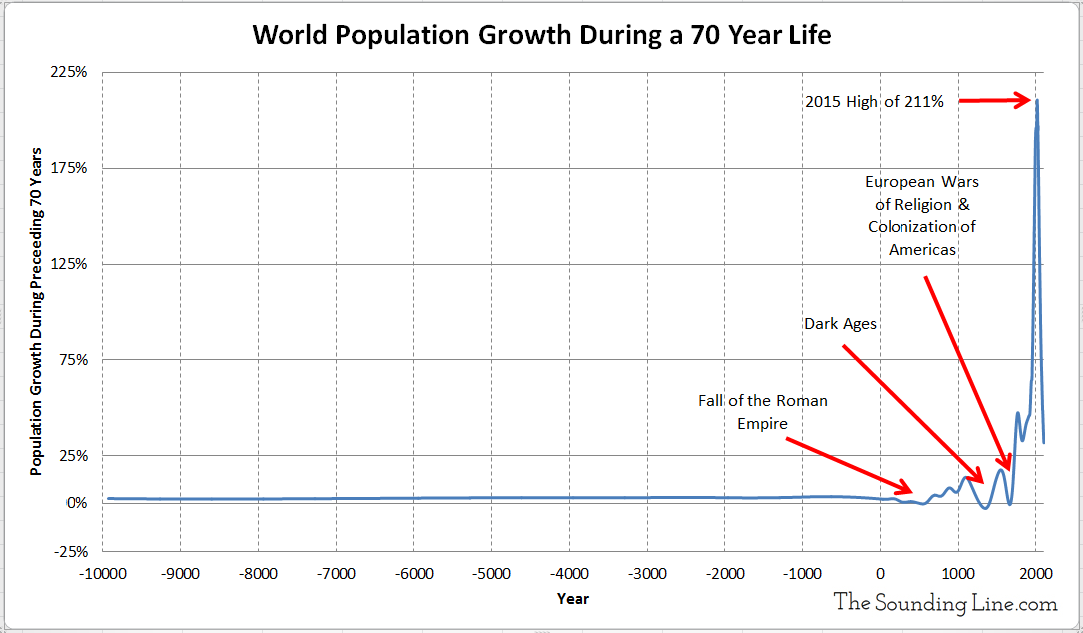Submitted by Taps Coogan on the 9th of November 2017 to The Sounding Line.
Enjoy The Sounding Line? Click here to subscribe for free.
One of the defining features of modern history has been extremely rapid population growth. After remaining nearly constant for thousands of years, human population growth began to accelerate sharply at the beginning of the Enlightenment in the early 18th century. Owing to massive improvements in technology, agriculture, and medicine, this trend accelerated further throughout the 19th and 20th centuries. As the wonderful website, ‘Our World in Data,’ notes:
“Recent estimates suggest that today’s population size is roughly equivalent to 6.5% of the total number of people ever born... Between 1900 and 2000, the increase in world population was three times greater than during the entire previous history of humanity—an increase from 1.5 to 6.1 billion in just 100 years.“
It took thousands of years of human history to reach a population of 1.5 billion, yet just a century triple it. Somewhat paradoxically, while the past three centuries of rapidly accelerating population growth have been very short compared to the entire arc of human history, they have been long relative to individual lives and our collective memories. Few if any of our modern institutions date back to the early 1700s, before this trend of accelerating growth started.
Accelerating population growth has been such a ubiquitous and overriding feature of the recent human experience that it can be difficult to imagine a modern world without it. The following chart shows the global population growth that a person that would have witnessed over the course of a 70 year life, from 10,000 BC until 2100 AD (including forecasted growth). For the first 10,000 years of history, the world population grew about 3% every 70 years. On the other hand, anyone born after 1893 has seen the world’s population at least double. Anyone born between 1939 and 1951 has seen the world’s population triple. Very few people alive today ever knew anyone who lived at a time when the world’s population wouldn’t at least double within an average lifespan. However, if projections of future growth are correct, 2015 will prove to have been the all time high. In fact, the 211% or 3.11 fold increase in world population seen in the 70 years leading to 2015 is the highest anyone is likely to see for generations.
(click on the chart to expand)

Previous declines in growth coincided with the fall of the Roman Empire, the Dark Ages, and the colonization of North and South America as well as the European Wars of Religion. All of these events entailed massive loss of life and suffering. Fortunately, what is driving this new trend of slowing growth is not death and destruction but declining fertility rates in virtually every country on Earth. As the following interactive chart from ‘Our World in Data‘ shows, even countries in Africa, which are still experiencing rapid population growth, are seeing fertility rates fall dramatically. (Toggle the blue slide under the map to change the date, or press the play button. You can also click on an individual country to see its trend)
The human population will continue to grow by billions in the coming decades and that growth will place ever greater strain on our limited resources. However, the trend of ever accelerating population growth is now reversing for the first time in hundreds of years.
Exactly what implications this will have for the world will only become clear with time. Many effects will be good and some likely won’t. From an economic perspective, one thing stands out as likely. For the last couple of centuries, if you were in the business of selling basic goods and services (shoes, bread, cutting hair,building homes, selling life insurance, etc…) the demand for products and services like yours would double, if not triple, within your life solely as a result of population growth. While there will still be some population growth, the assumption of accelerating growth is simply no longer valid, nor are assumptions of economic growth that derive from it. Certainly this will have implications on the global economy in ways that people have not experienced for a very long time.
P.S. We recently added email distribution for The Sounding Line. If you would like to be updated via email when we post a new article, please click here. It’s free and we won’t send any promotional materials.
Would you like to be notified when we publish a new article on The Sounding Line? Click here to subscribe for free.

